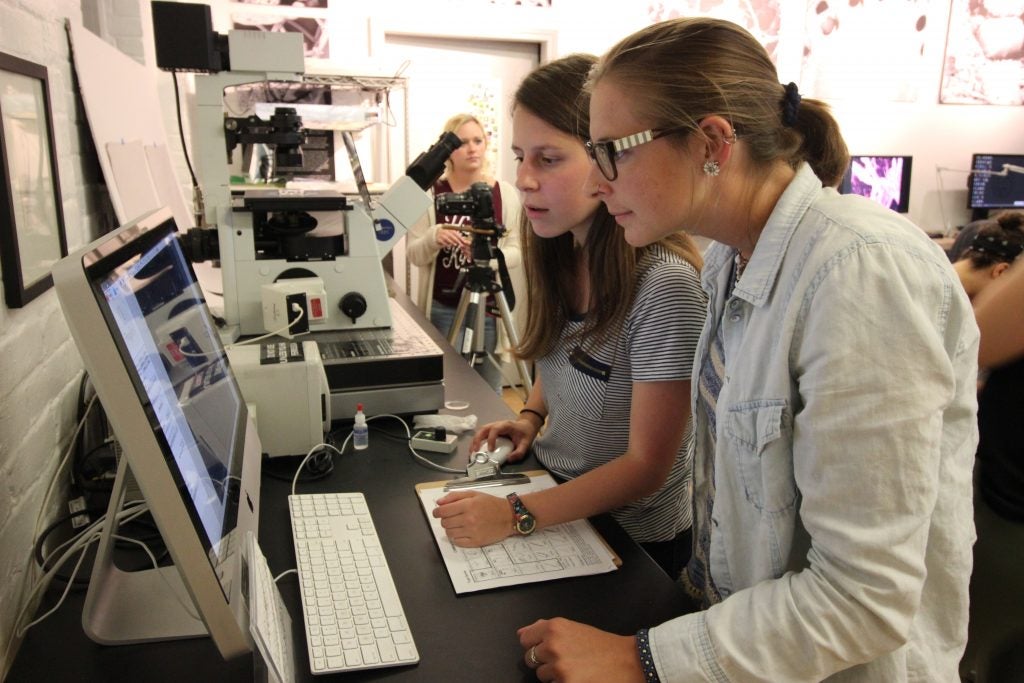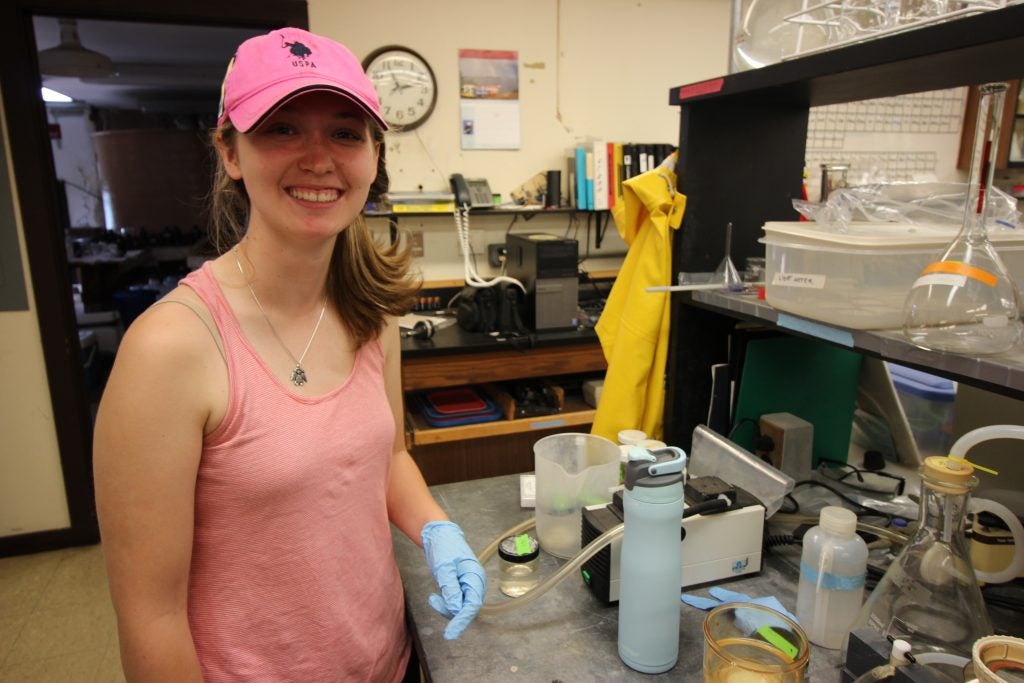
NARRAGANSETT, R.I.—Rhode Island College senior Eva Lincoln came to a definitive realization after participating in the Summer Undergraduate Research Fellowship (SURF) last year as an RI-INBRE student conducting research in pharmaceutical chemistry: she wanted to be outdoors.
“Our environment at the end of the day is my passion,” says the Tiverton native. “As much as I enjoy it, I can’t see myself only doing lab work day in and day out.”
Now, as an RI C-AIM SURF student, Lincoln is getting a first-hand education in the lives of phytoplankton of Narragansett Bay with mentor Dr. Susanne Menden-Deuer.
“I am trying to soak in the as much as I can so it leaves me with a good foundation,” she asserts. “Susanne has been giving me plenty of papers to read to catch me up on the stuff they’re doing in the lab.”
Substantive questions of how phytoplankton interact in the marine environment are already filling Lincoln’s mind. The RIC chemistry major is excited to study whether adding nutrients to the phytoplankton environment has an impact on zooplankton grazing rates.
“Plankton are an essential part of the food web and are eaten by so many things,” she explains. “If you add more nutrients to the phytoplankton, does that make them happier and therefore better food for the zooplankton?”
Lincoln, who tutors anatomy and physiology at the Community College of Rhode Island, plans to continue her studies in chemical oceanography under advisor and RI C-AIM researcher Dr. Sarah Knowlton, professor of Physical Sciences at RIC.
“I have always been the pain in the butt kid who asks, ‘why does that happen?’” she laughs. “I like the challenge chemistry presents, and I am more math-driven. No offense, biology!”
From engineering to zooplankton

Through the encouragement of her advisor Dr. Jennifer Pearce, assistant professor of Chemistry at Roger Williams University, SURF student Juliette Caffery is studying zooplankton in Narragansett Bay. As an engineering major, however, Caffery has had to play a game of catch-up over the past weeks.
“This is my first experience doing any kind of research, so it is an eye into the process,” says Caffery, who hails from Berkley Heights, New Jersey.
Caffery goes out every Monday to collect samples in the waters off Fox Point in Providence. Then, she goes through the process of filtering and drying the zooplankton samples so that an accurate count can be made.
“Theoretically, I am finding the mass of the zooplankton,” she explains. “It is not completely accurate, though, because there is a lot of detritus and microplastics in the water.”
She then compares her own data to historical information collected by scientists at the University of Rhode Island’s Graduate School of Oceanography (URI GSO) since the 90s. Caffery, who is conducting research under RI C-AIM researcher and professor of Oceanography Dr. Candace Oviatt, also gives a hand to the graduate students conducting separate research at the Marine Research Systems Laboratory (MERL) on URI’s Bay Campus.
“In the morning, I will help another grad student feed her lobsters,” notes Caffery with a smile.
The RWU junior explains that better understanding the amount of zooplankton in Narragansett Bay will help scientists determine whether efforts to clean the bay over the past several years are going too far.
“Years ago, [Rhode Island] began reducing nutrients in the bay because the water was running out of oxygen,” she says. “But fishermen have started talking about how they don’t see zooplankton in the water any more. We are looking to see if there less zooplankton now than in the past. We are expecting there will be, but we also want to make sure there is still enough there to support the ecosystem.”
Although Caffery ultimately plans to pursue graduate work in biomechanical engineering, she knows that the SURF experience provides great insight into any future career in research.
“This work will be helpful no matter what I go on to do.”
Written by Shaun Kirby, RI C-AIM Communications & Outreach Coordinator

 RI NSF EPSCoR is supported in part by the U.S. National Science Foundation under EPSCoR Cooperative Agreements #OIA-2433276 and in part by the RI Commerce Corporation via the Science and Technology Advisory Committee [STAC]. Any opinions, findings, conclusions, or recommendations expressed in this material are those of the author(s) and do not necessarily reflect the views of the U.S. National Science Foundation, the RI Commerce Corporation, STAC, our partners or our collaborators.
RI NSF EPSCoR is supported in part by the U.S. National Science Foundation under EPSCoR Cooperative Agreements #OIA-2433276 and in part by the RI Commerce Corporation via the Science and Technology Advisory Committee [STAC]. Any opinions, findings, conclusions, or recommendations expressed in this material are those of the author(s) and do not necessarily reflect the views of the U.S. National Science Foundation, the RI Commerce Corporation, STAC, our partners or our collaborators.